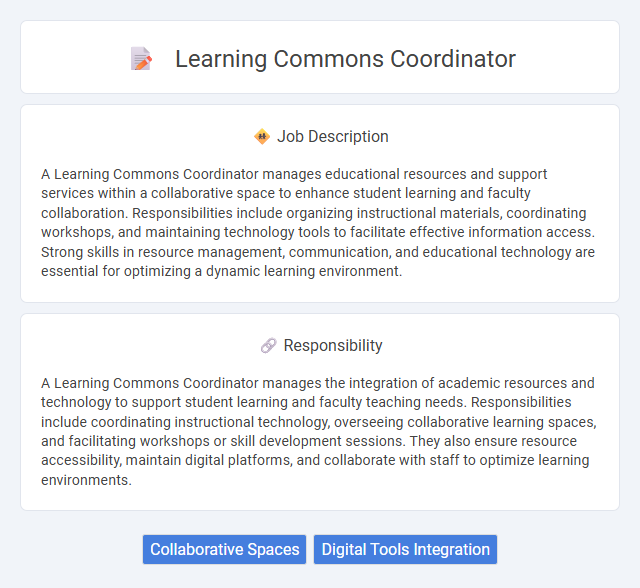
A Learning Commons Coordinator manages educational resources and support services within a collaborative space to enhance student learning and faculty collaboration. Responsibilities include organizing instructional materials, coordinating workshops, and maintaining technology tools to facilitate effective information access. Strong skills in resource management, communication, and educational technology are essential for optimizing a dynamic learning environment.
Individuals with strong organizational skills and a passion for educational support are likely suitable for the Learning Commons Coordinator role. People who thrive in collaborative environments and possess effective communication abilities may find this job aligns well with their strengths. Those who prefer structured, resource-intensive settings could experience a higher probability of success and satisfaction in this position.
Qualification
A Learning Commons Coordinator typically requires a bachelor's degree in education, library science, information technology, or a related field, with many positions preferring a master's degree. Proven experience in managing educational resources, digital learning tools, and collaborative environments is essential. Strong organizational, communication, and technology integration skills are critical to effectively support students, faculty, and staff within a learning commons setting.
Responsibility
A Learning Commons Coordinator manages the integration of academic resources and technology to support student learning and faculty teaching needs. Responsibilities include coordinating instructional technology, overseeing collaborative learning spaces, and facilitating workshops or skill development sessions. They also ensure resource accessibility, maintain digital platforms, and collaborate with staff to optimize learning environments.
Benefit
The Learning Commons Coordinator likely enhances access to diverse educational resources, improving student support and engagement. This role probably fosters collaboration among faculty and learners, promoting a more integrated and effective learning environment. Opportunities for professional growth and involvement in innovative educational initiatives may also be a significant benefit.
Challenge
The role of a Learning Commons Coordinator likely involves managing diverse responsibilities such as coordinating resources, supporting student learning, and fostering collaboration among staff and students. Challenges may arise in balancing technology integration with traditional educational methods while ensuring accessibility and engagement for all learners. Adapting to rapidly changing educational needs and addressing conflicting demands could be common obstacles in this position.
Career Advancement
A Learning Commons Coordinator oversees the integration of resources and technology to support student learning and academic success, enhancing institutional efficiency. Mastery in educational technology, library sciences, and project management paves the way for career growth into academic leadership or administration roles. Building expertise in data-driven decision-making and collaborative program development significantly boosts opportunities for advancement in higher education settings.
Key Terms
Collaborative Spaces
A Learning Commons Coordinator manages collaborative spaces designed to foster interactive learning and group engagement, ensuring resources, technology, and furniture support diverse educational activities. They coordinate space scheduling, facilitate workshops, and implement tools that enhance cooperative study and innovative projects. Expertise in educational technology and space design is essential to promote dynamic, user-centered environments.
Digital Tools Integration
A Learning Commons Coordinator specializing in Digital Tools Integration manages the implementation and optimization of educational technologies within a learning environment. Responsibilities include training staff and students on digital platforms, ensuring seamless access to online resources, and collaborating with IT teams to maintain up-to-date software and hardware. Expertise in LMS (Learning Management Systems), virtual collaboration tools, and digital content management is essential for enhancing the learning experience.
 kuljobs.com
kuljobs.com